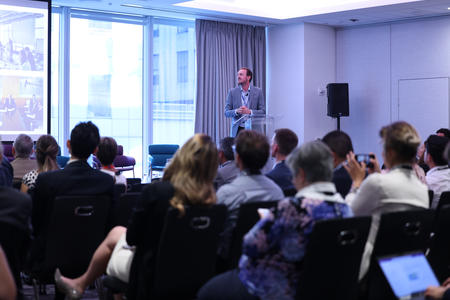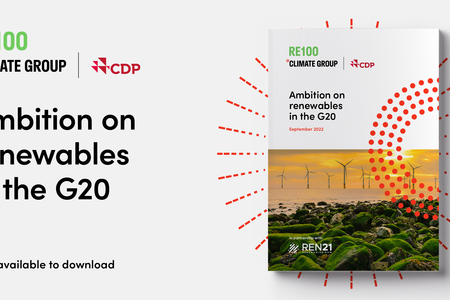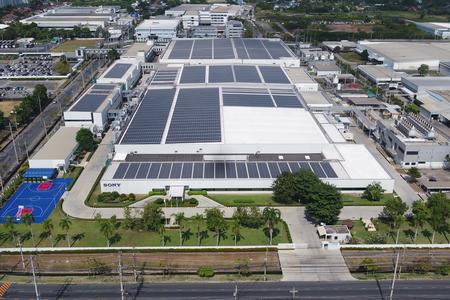Last week, Bloomberg Green reported that 87 countries have now reached the critical threshold of green technology usage that has been shown to lead to mass adoption across energy grids. For many, this will be a piece of much-needed good news amidst a growing fuel crisis that renewables must play a key role in addressing.
COP26 brought a new focus on the role of the private sector in meeting the Paris Agreement’s ambition of achieving net-zero global emissions by 2050. The conference discussed how the private sector could improve financing for adaptation and the decarbonization of emissions-intensive sectors, and, critically, called out the fossil fuel sector’s reliance on subsidies.
Globally, corporations account for half of all global electricity consumption, and 25% of all greenhouse gas emissions result from power generation. Companies have a clear role to play in the energy transition through their actions. As the energy crisis continues to impact global markets, it is more important than ever that companies transition to 100% renewable electricity credibly and at pace.
RE100 technical criteria
RE100 maintains the RE100 technical criteria, which are the rules that member companies follow when procuring renewable electricity and defining progress towards their RE100 targets. The criteria exist as the only globally applicable guidance framework for corporate procurement of renewable electricity and for setting organisation-wide targets to increase use of renewable electricity. They are widely referred to as a standard by RE100 members and non-members alike, and this year RE100 has made some important changes to the criteria that bring the initiative in line with best practice.
CDP has over 20 years’ experience as the world’s leading environmental reporting platform. Its experience has shown that standardised criteria and guidance are essential for companies to disclose objective, comparable data on their climate impacts, and for that data to be useful in developing impactful interventions. CDP brings this experience to RE100’s technical criteria, which helps influence the insights the initiative has into its members’ actions and the resultant policy engagement work the initiative pursues.
Why are changes to the technical criteria necessary?
Markets are dynamic by nature. Renewable electricity procurement is a fast-changing field, and the technical criteria must remain relevant. The criteria are revised on a two-year cycle to recognise shifts in markets, new and credible sourcing options for renewable electricity, and to ensure that the criteria support RE100’s mission as a leadership initiative dedicated to accelerating the change towards carbon-free grids by 2040.
2022 update
Following meetings with RE100 member companies, a public consultation, and consultation with the RE100 technical advisory group (TAG), RE100 has made two important changes to the technical criteria. These changes consist of clearer guidance on credible procurement in Europe, and a new requirement for purchasing of renewable electricity to be focused on new projects.
A fifteen-year commissioning or re-powering date limit
The RE100 technical criteria now require purchasing of renewable electricity to observe a 15 year commissioning or re-powering date limit. RE100 has made this change to directly increase its members’ demand for new renewable electricity capacity, and to signal to any company using the RE100 technical criteria that supporting new projects is central to the energy transition.
This update enhances the credibility of RE100 member claims by bringing the technical criteria in line with best practice in key markets. Furthermore, a commissioning or re-powering date limit also puts pressure on energy suppliers to be more transparent about their products. In a contract with an energy supplier, it is often difficult to establish which technologies are used in the supply, or, crucially, how old the projects used in the supply are.
Ultimately, the limit is in-step with global renewable energy targets, best practice in corporate procurement, and gives companies more leverage to pressure governments to add renewable electricity capacity and lower barriers to procurement from it. You can read more about this update, and exceptions, on the RE100 guidance page.
Single market definitions
RE100 has clear guidance on market boundaries for claims to use of renewable electricity. A claim to use of renewable electricity is only credible if it’s based on generation of renewable electricity occurring in the same market for renewable electricity that the claim is made in. More importantly, well-defined market boundaries require companies to act in every market in which they operate.
As such, RE100 is changing its definition of the single market for renewable electricity in Europe to strengthen claims to use of renewable electricity made there. RE100 will consider countries and areas meeting all the following conditions to form a single market for renewable electricity in Europe:
- The country is in the EU single market.
- The country is a member of the Association of Issuing Bodies (AIB) – issuing European Energy Certificate System (EECS) Guarantees of Origin.
- The country has a grid connection to another country meeting the first two rules.
You can see the list of countries affected by this change in our updated technical criteria document, found on the RE100 guidance page.
How does this benefit RE100 members?
The technical criteria bring several benefits to RE100 members.
- The criteria ensure members’ claims are valuable and are the basis of their recognition as global leaders in renewable procurement.
- They give members leverage with internal and external stakeholders to demand new renewables capacity. This ultimately drives grid transformation and increases the price competitiveness of renewables.
- The transition to 100% renewable electricity not only helps business to future-proof their operations against fuel supply chain risks and to access new markets but, crucially, will lower barriers to voluntary procurement of renewable electricity.
These technical criteria updates are vital to RE100’s advocacy work, enabling the initiative to campaign for a system that allows companies to buy renewable electricity and to financially incentivise new renewables generation. This work ultimately drives grid transformation, accelerating the decarbonization of electricity as is vitally necessary on a global scale.
Further reading on the RE100 website
To accompany the release of the new technical criteria, RE100 has also published the feedback it received in its public consultation, with comments.
The new technical criteria, and the results of the consultation, are available on the RE100 guidance page.



